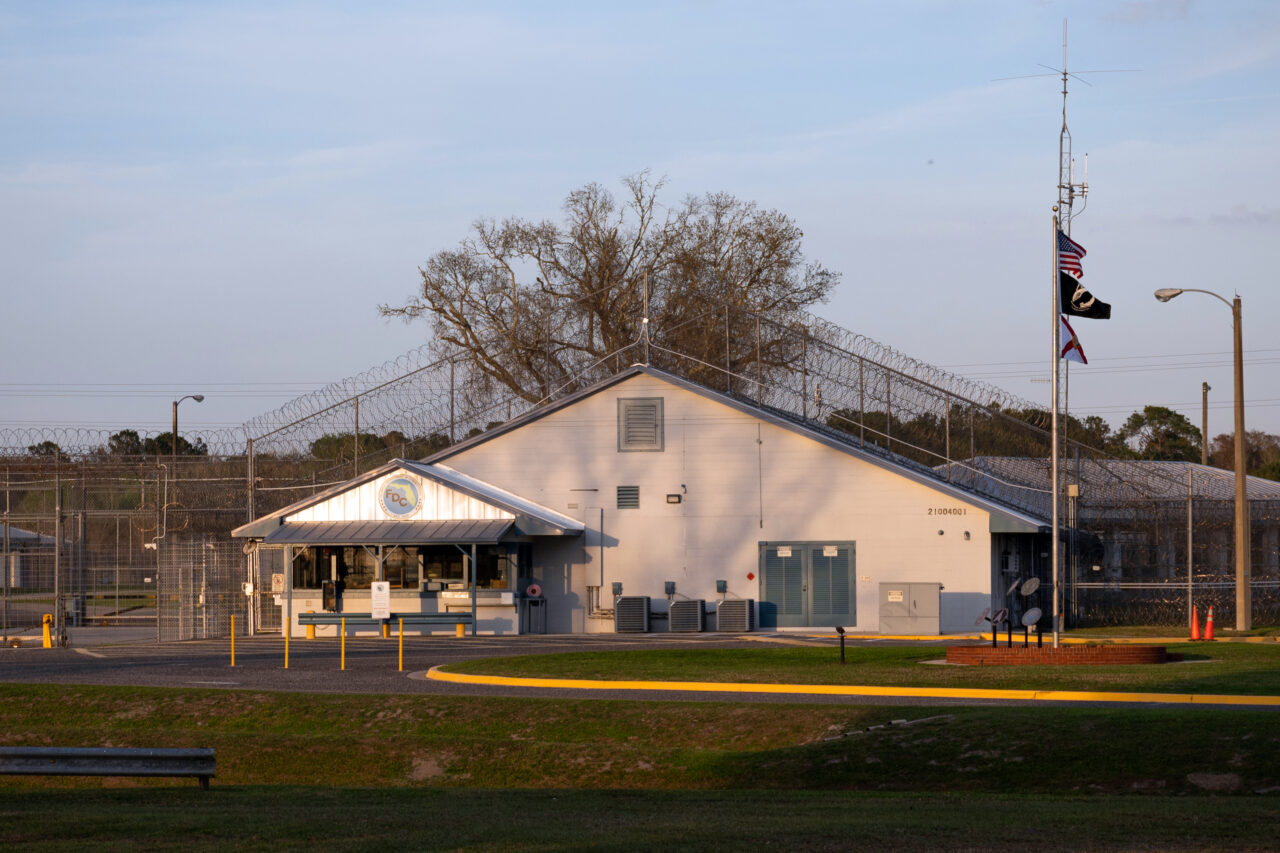
 James D. Ford spent nearly every moment of the last 25 years in a six-foot by nine-foot cell on Florida’s Death Row. From the moment a judge in Charlotte County in southwest Florida handed down his death sentence in 1999, Ford’s only option was to wait.
James D. Ford spent nearly every moment of the last 25 years in a six-foot by nine-foot cell on Florida’s Death Row. From the moment a judge in Charlotte County in southwest Florida handed down his death sentence in 1999, Ford’s only option was to wait.
He waited as his lawyers unsuccessfully submitted appeal after appeal to Florida’s higher courts. He waited for rulings on motions meant to turn his death sentences into lifetime confinement. After his appeals lapsed and his sentence stood, he waited for his death warrant.
Gov. Ron DeSantis signed Ford’s execution order earlier this year and set his execution for Thursday. His attorneys have challenged long-standing federal and state precedents in attempts to avoid his death.
‘A gruesome discovery’
On a warm Monday in April, employees at the South Florida Sod Farm were searching the property’s 7,000 acres for Greg Malnory. Malnory, who had joined the staff a few months prior, went fishing on the farm with his wife and daughter a day earlier and hadn’t shown up to work Monday morning.
General manager Raymond Caruthers was called to a reservoir on the south side of the farm after lunch, he told lawyers in 1998. Three farm employees made what Judge Cynthia Ellis described as “a gruesome discovery”: Greg and Kim Malnory were found murdered next to Greg’s truck, and their toddler, Maranda, was strapped – alive – in a car seat inside.
The sentencing order said Greg Malnory, 25, had been shot in the head and beaten, and his throat had been slit. Kim Malnory, 26, had been beaten, sexually assaulted and shot with a rifle.
The couple’s daughter, Maranda, just shy of her second birthday, had been left alone for at least 18 hours. She was covered in her mother’s blood and mosquito bites. Ellis said Maranda’s survival could “only be the product of divine intervention.”
Living in Port Charlotte, and now 29, Maranda said she preferred not to discuss her parents’ murders.
“With everything going on, these two have been on my mind a lot lately,” she wrote last week on social media, with a photograph of her parents’ graves. “I make you proud every day, and I keep a picture of the three of us on my desk! I remind myself every day that I do it for you both. The last month has been the hardest; no one ever prepares you for it. As we get closer please be patient with me, I promise I’m not ignoring anyone I’m literally trying to survive.”
Police focused on Ford nearly immediately. He was the last person to see the Malnorys alive when he went fishing with them Sunday, and pieces of Ford’s rifle, ‘Old Betsy,’ were found scattered at the crime scene.
After 11 days of trial, a jury voted 11-1 to recommend a death sentence for Ford. Ellis agreed, sentencing Ford to death for the “heinous, atrocious and cruel” murders.
Florida’s death penalty since 1999
The jury in Ford’s case recommended the death penalty for both murders, but the judge made the final sentencing decision. Stacy Biggart, a legal skills professor at the University of Florida, said judges had held the final verdict for decades.
Judges “almost always” followed the jury’s advisory verdict, but they were ultimately responsible for finding the aggravating factors that merited a death sentence, like prior violent felonies.
The 2016 U.S. Supreme Court ruling in Hurst v. Florida upended the process, finding that the scheme violated defendants’ Sixth Amendment right to a trial by a jury.
“The ruling said that the jury has to find the facts necessary to impose the death penalty,” Biggart said. “The default sentence without aggravators is life. After Hurst, the jury had to find the aggravators.”
The Hurst decision prompted a “flurry of litigation” in death penalty cases around the state. Biggart joined Capital Collateral Regional Counsel, the office that represents death row inmates in post-conviction appeals, less than one month after the ruling.
“There were arguments that the death penalty was unconstitutional, that the ruling should be retroactive to all death penalty cases in Florida,” she said. “The Florida Supreme Court had to decide how to apply Hurst.”
The Florida Supreme Court made its decision in October 2016, requiring a unanimous death sentence and allowing certain death penalty cases to be reopened for litigation. The court only made its verdict retroactive to June 24, 2002, when the U.S. Supreme Court ruled similarly in an Arizona case.
Ford’s death penalty case was finalized in May 2002 – less than one month before the court’s cutoff.
“It’s not fair,” Biggart said. “If it was unconstitutional on June 24, 2002, it was unconstitutional before then.”
The Florida Legislature passed a bill mandating unanimous death penalty verdicts in March 2017. The law was in place until 2023, months after a divided jury sentenced Marjory Stoneman Douglas High School shooter Nikolas Cruz to life.
“Society doesn’t like the fact that he got life,” Biggart said, “so we changed the law to make sure people like him could get what they deserve.”
The amended death penalty statute, which became law in April 2023, requires only eight of a jury’s 12 members to impose the death penalty. Florida and Alabama are the only states that allow a nonunanimous death penalty.
DeSantis signed a bill in 2023 that would allow the death penalty in sexual battery cases with a victim under 12 years old, despite U.S. Supreme Court rulings that the death penalty cannot be imposed in cases where the victim didn’t die.
Additionally, the Florida Legislature’s recent immigration bill, known as the TRUMP Act, would require the death penalty for an “unauthorized alien” who commits a capital crime. The U.S. Supreme Court has also ruled that mandatory death sentences are unconstitutional.
Recent Florida death penalty laws are unconstitutional, Biggart said, which may be part of the reason they are passed.
“If these laws are passed and challenged, courts might revisit death penalty laws,” she said. “Florida citizens seem to like the death penalty. I think the death penalty in Florida is going to thrive.”
Ford’s final appeals
The last weeks of Ford’s 20 years of appeals have seen petitions from outside organizations and motions from his lawyers urging a stay in his execution.
Maria DeLiberato, the executive director of Floridians for Alternatives to the Death Penalty, said the state has the opportunity to “bring justice without causing more violence” in Ford’s case.
“Like many people on death row, he didn’t get a death sentence with a happy, healthy childhood,” she said. “Mercy is always appropriate, especially for someone who lives a peaceful life and has family who cares for him.”
In motions submitted to the U.S. Supreme Court on Sunday, Ford’s lawyers, Ali Shakoor and Adrienne Shepherd, argued that the 2005 decision in Roper v. Simmons justified pausing his execution.
His lawyers did not respond to emails or phone messages for a week. Gerod Hooper, the chief assistant at Capital Collateral Regional Counsel-Middle, said the basis of the appeal was Ford’s mental age.
He said the U.S. Supreme Court prohibited executions for people who are mentally or chronologically under 18 but only for conditions that “prevent the brain from developing.”
“Mr. Ford … is mentally around 12 years old, but because his deficiency didn’t happen until after he was 18, he can get executed,” Hooper said. “Our position is that (it) is illogical. Mental deficiency should be applicable if it existed at the time of the crime.”
The U.S. Supreme Court has the final say on Ford’s execution. He is set to be executed Thursday evening.
___
Bea Lunardini reports via Fresh Take Florida, a University of Florida College of Journalism and Communications news service. The reporter can be reached at [email protected]. You can donate to support our students here.




One comment
Donna King
February 13, 2025 at 9:46 am
Should have executed him within a month of being found guilty. What a waste of tax payers funds. If he killed them he needed to go ASAP
Comments are closed.